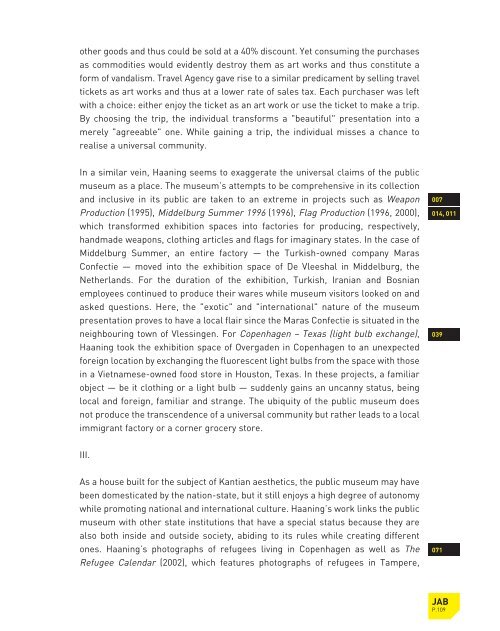download catalogue high resolution pdf (22.3 mb) - Jens Haaning
download catalogue high resolution pdf (22.3 mb) - Jens Haaning
download catalogue high resolution pdf (22.3 mb) - Jens Haaning
Create successful ePaper yourself
Turn your PDF publications into a flip-book with our unique Google optimized e-Paper software.
other goods and thus could be sold at a 40% discount. Yet consuming the purchases<br />
as commodities would evidently destroy them as art works and thus constitute a<br />
form of vandalism. Travel Agency gave rise to a similar predicament by selling travel<br />
tickets as art works and thus at a lower rate of sales tax. Each purchaser was left<br />
with a choice: either enjoy the ticket as an art work or use the ticket to make a trip.<br />
By choosing the trip, the individual transforms a "beautiful" presentation into a<br />
merely "agreeable" one. While gaining a trip, the individual misses a chance to<br />
realise a universal community.<br />
In a similar vein, <strong>Haaning</strong> seems to exaggerate the universal claims of the public<br />
museum as a place. The museum’s attempts to be comprehensive in its collection<br />
and inclusive in its public are taken to an extreme in projects such as Weapon<br />
Production (1995), Middelburg Summer 1996 (1996), Flag Production (1996, 2000),<br />
which transformed exhibition spaces into factories for producing, respectively,<br />
handmade weapons, clothing articles and flags for imaginary states. In the case of<br />
Middelburg Summer, an entire factory — the Turkish-owned company Maras<br />
Confectie — moved into the exhibition space of De Vleeshal in Middelburg, the<br />
Netherlands. For the duration of the exhibition, Turkish, Iranian and Bosnian<br />
employees continued to produce their wares while museum visitors looked on and<br />
asked questions. Here, the "exotic" and "international" nature of the museum<br />
presentation proves to have a local flair since the Maras Confectie is situated in the<br />
neighbouring town of Vlessingen. For Copenhagen – Texas (light bulb exchange),<br />
<strong>Haaning</strong> took the exhibition space of Overgaden in Copenhagen to an unexpected<br />
foreign location by exchanging the fluorescent light bulbs from the space with those<br />
in a Vietnamese-owned food store in Houston, Texas. In these projects, a familiar<br />
object — be it clothing or a light bulb — suddenly gains an uncanny status, being<br />
local and foreign, familiar and strange. The ubiquity of the public museum does<br />
not produce the transcendence of a universal community but rather leads to a local<br />
immigrant factory or a corner grocery store.<br />
III.<br />
As a house built for the subject of Kantian aesthetics, the public museum may have<br />
been domesticated by the nation-state, but it still enjoys a <strong>high</strong> degree of autonomy<br />
while promoting national and international culture. <strong>Haaning</strong>’s work links the public<br />
museum with other state institutions that have a special status because they are<br />
also both inside and outside society, abiding to its rules while creating different<br />
ones. <strong>Haaning</strong>’s photographs of refugees living in Copenhagen as well as The<br />
Refugee Calendar (2002), which features photographs of refugees in Tampere,<br />
007<br />
014, 011<br />
039<br />
071<br />
JAB<br />
P.109


